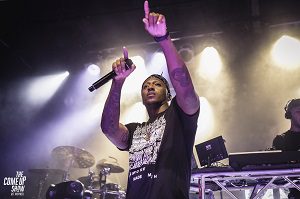If you can think of a stereotype for Muslim women, the odds are that Mona Haydar utterly shatters it. A mother of two, this proud woman also has a Masters in Christian Ethics, 13 years under her belt as a performance poet and a burgeoning second career in rap music. A first generation American with Syrian roots, Haydar’s rap music first gained serious attention when her music video “Hijabi (Wrap My Hijab)” went viral. The song, like most of Haydar’s music, was unapologetically political, but that has not stopped her from garnering quite a bit of support and popularity.
Haydar’s music draws on both Arab pop and folk sounds and classic hip-hop and pop beats. She was influenced by iconic Arab performers such as Um Kulthoum, Fayrouz and AbdelHaim Hafiz as well as a variety of American artists including Princess Nokia, J. Cole, Jimi Hendrix, the Black Keys, Thelonious Monk and Prince. Despite the Arab influence, however, Haydar says she gravitated towards rap as a genre because that was what she heard when she was young. “I didn’t grow up with Arabic music,” Haydar said. “I grew up in Flint, [Michigan,] where the cars drove by and you heard what you heard. You didn’t hear what you hear in the Middle East…You heard Lauryn Hill and Erykah Badu and whatever was on the radio at the time.”
The sound Haydar ended up developing was certainly popular. “Hajabi (Wrap My Hijab)” skyrocketed to nearly a million views on YouTube in less than a month. “I definitely didn’t expect the video to do what it has,” Haydar said. “It’s my first attempt at music!”
Being new to the industry certainly has not stopped Haydar from being determined to get her messages, political and otherwise, through to her audience. “Hijabi” was intended to serve as an anthem for Muslim women who are proud to wear the hijab, and Haydar has stated that she wants to be a visible symbol for Muslim girls.
“I’m excited by the fact that [my music is] normalizing the narrative of Muslim American women and women in general,” Haydar said. “For young Muslim girls, to see a girl that looks like her mom in a music video, who doesn’t have a stick-thin body, who isn’t wearing gobs and gobs of makeup, who is just a normal woman doing normal things in a video, [is so important.] I’m just really excited that that’s out in the world for young girls to see and feel like, ‘I can look like whatever I want and be in a music video, and nothing can stop me.’”
Given how rapidly her music is capturing attention, she might well get her wish and be simply the first of many Muslim women to break into the American music industry.


